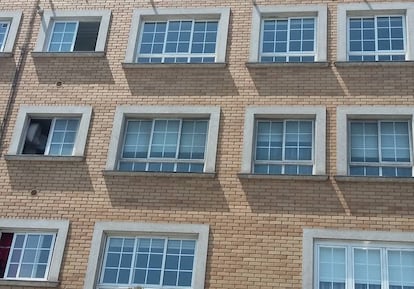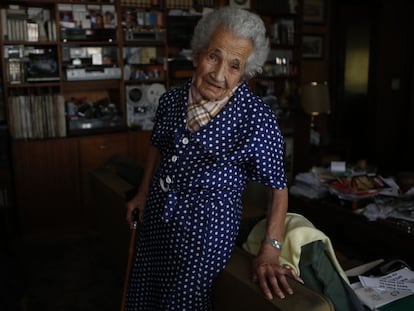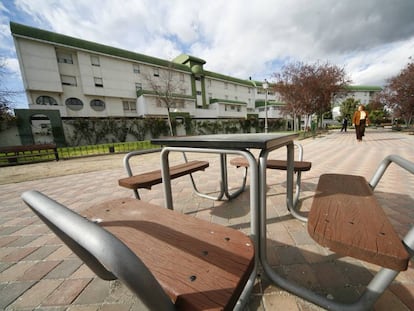For Spain¡¯s elderly living alone, how death can sometimes go undetected
Discovery of mummified remains of woman dead for four years highlight Spain¡¯s isolated ageing population
When Mar¨ªa del Rosario Otero Vietes died in late 2011, the nearly 130 neighbors in the block where she rented an apartment in the small town of Culleredo, in Spain¡¯s northwestern region of Galicia, barely noticed her absence, saying they can¡¯t remember having seen her again. That was despite mail that went uncollected and the increasingly abandoned state of her car, parked in a garage under the block: she and her mother had always kept to themselves, the neighbors said.

But on July 3, after a neighbor finally reported her missing, Civil Guard officers entered Otero¡¯s apartment and found her mummified body lying in the hall. Based on the dates on the correspondence accumulated in her mail box and by the concierge, they calculate she had been dead ¡°at least four years.¡± The neighbor who reported her disappearance believes it is more like five.
The results of an autopsy of Otero¡¯s body have not been released yet. The authorities say she would have been aged 56 had she lived, and that first indications suggest she died from natural causes. Her body was cremated on July 6 by the local authorities, with no relatives in attendance.
An elderly person who is malnourished and dies in summer is likely to mummify Forensic scientist Fernando Serrulla
Over the five years since Otero was last seen, the rent on her apartment reportedly continued to be paid punctually from her mother¡¯s bank account each month to the property company that owns the apartment building. However, the water and electricity had been cut off for non-payment of bills.
Such cases are not uncommon in Spain, with several bodies that have slowly mummified over time found each year.
Last year, the body of a woman who was due to be evicted from her house in the small town of Ll¨ªria, in Valencia, was discovered in a mummified state, along with several of her pets.
In 2015, in Requena, also in Valencia, the desiccated bodies of a brother and sister were discovered by their father. They had been dead for at least nine months. And in 2014, in Palma de Mallorca, children playing in an abandoned house discovered the dried-out remains of a man.
A year ago,? in Vigo, Galicia, the bodies of 15 people who lived alone were found?in one week
In late 2012 and early 2013, there were several such incidents. In the small Madrid town of Ciempozuelos, a man who had been released from prison after serving a two-year prison sentence for rape, went to the apartment he had previously shared with his wife only to find her mummified body in bed. Neighbors had complained about the smell, but nobody had entered the property. Meanwhile, in Madrid¡¯s working-class Barrio del Pilar district, the remains of a woman were only discovered after neighbors suspected that her apartment was the source of flooding. A month later, the mummified remains of a 73-year-old man who lived alone were found in his central Madrid apartment.
In part, the problem is a result of the growing number of Spaniards who now live alone. The National Statistics Office estimates that there are now 4.6 million homes in Spain, or one in four, with just one occupant, a rise of 54,000 on 2015. Of the 10% of Spaniards who now live alone, 41.7% are aged over 65, and 70.7% of them widows.?
A year ago, a magistrate in Vigo, in Galicia, expressed her concern at the discovery in one week of 15 bodies of people living alone.
Forensic scientist Fernando Serrulla, with the regional authorities in Galicia, says when that natural mummification takes place in a closed room, the smell is rarely detected outside a property. Otero¡¯s neighbors say they never noticed any unpleasant smells emanating from her apartment. Depending on temperature and humidity, as well as the size of the body, desiccation can take up to 18 months, says Serrulla. Once the process is complete, the body has lost all its water and is light and highly fragile.
The National Statistics Office says 10% of Spaniards now live alone
¡°The most important thing is the speed that dehydration takes place, which prevents putrefaction,¡± says Serulla, adding that the thinner the deceased, the quicker the process. He says this explains why the elderly, who are often frail ¡°and already dehydrated,¡± tend to mummify if their body is not found.
¡°Death that produces dehydration, such as diarrhea, hemorrhages or heat stroke, causes mummification,¡± he says, adding: ¡°An elderly person who is malnourished, thin and who dies from diarrhea in summer in a dry place is likely to mummify.¡±
English version by Nick Lyne.
Tu suscripci¨®n se est¨¢ usando en otro dispositivo
?Quieres a?adir otro usuario a tu suscripci¨®n?
Si contin¨²as leyendo en este dispositivo, no se podr¨¢ leer en el otro.
FlechaTu suscripci¨®n se est¨¢ usando en otro dispositivo y solo puedes acceder a EL PA?S desde un dispositivo a la vez.
Si quieres compartir tu cuenta, cambia tu suscripci¨®n a la modalidad Premium, as¨ª podr¨¢s a?adir otro usuario. Cada uno acceder¨¢ con su propia cuenta de email, lo que os permitir¨¢ personalizar vuestra experiencia en EL PA?S.
?Tienes una suscripci¨®n de empresa? Accede aqu¨ª para contratar m¨¢s cuentas.
En el caso de no saber qui¨¦n est¨¢ usando tu cuenta, te recomendamos cambiar tu contrase?a aqu¨ª.
Si decides continuar compartiendo tu cuenta, este mensaje se mostrar¨¢ en tu dispositivo y en el de la otra persona que est¨¢ usando tu cuenta de forma indefinida, afectando a tu experiencia de lectura. Puedes consultar aqu¨ª los t¨¦rminos y condiciones de la suscripci¨®n digital.










































